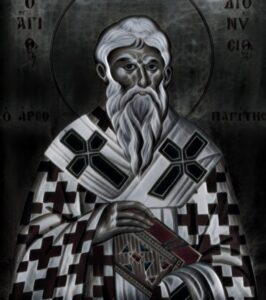Work on The Śūraṃgamasamādhisūtra has been shelved until a later date. For now our interest and purpose turns to the cyclic nature of these blogs, as February into March recounts the spiritual writings of the Masters of old. The premier frontrunner in this mystical enterprise is Dionysius the Areopagite. In the past we have presented insight into many of his works, but our present task is to focus on the one work which serves as a “word-key” for the rest, the Theologia Mystica or the Mystical Theology. This work has served as a major source of inspiration for others who have highlighted the negative, or via negativa way—such as the anonymous writer of the Cloud of Unknowing, John of the Cross, Teresa of Avila and Meister Eckhart. Brief as it may be, it is the core solidification of all that follows along the path of Mystical Darkness—or the Luminous Way. St. Paul once encountered an inscription in his travels which stated, “To the Unknown God.” Initially, this provided the fodder for Dionysius to utilize the exact language of the “Unknown” God that encapsulated his deeper use of “Unknowing” which triggered such vast spiritual treatises like the present one and indeed of his entire corpus.
While generally addressing a Christian audience, his work has the flavor of a Zen Master—getting to the very root of the matter—but unfortunately finds himself entrapped in a Christian milieu. It’s a sad fact, but if you want to survive in a Christian world, in a Mohammedan world, in a Judaic world, then you have to use their language and level of understanding. So, we find him using vague terminology—actual facades to protect himself from the religious authorities of the day. The exoteric church always annihilates anything that does not concur with its Dogmatic Theology. Fortunately for posterity Dionysius chose the path of a non-martyr, and in so doing chose the True and Authentic Universalism.
An alternate title for this treatise could be entitled To Timothy, regarding Mystical Theology. Timothy is later referred to as “My dear spiritual friend” in his other works, but now the general sense is that of being Dionysius’ disciple; in this fashion he is Timothy’s Spiritual Mentor, or Father in the Spirit. Dionysius’ mission here is to reveal God’s Word in a hidden manner: here therein rests the mystery, how something of God is both hidden (Unborn) and yet revealed, both known and “unknown,” this is what the Dionysian affirmations and negations are all about, but arcanely advanced.

